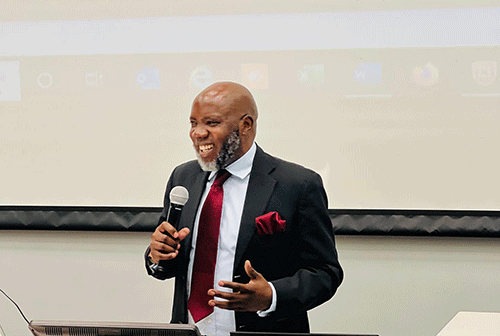The country’s media must move away from its propensity to report on conflict, fear, drama and revenge, executive director in the information ministry Audrin Mathe has said.
“The media and the government are not enemies. The government needs the media to report on its agenda so that the citizens are better informed. The government will always be the biggest newsmaker,” he said.
He said this yesterday during the launch of the Africa Media Barometer Namibia Report 2022. The government, Mathe said, accepts that editors have the prerogative of opinion, but adds such opinions should not be paraded as facts.
“At the centre of the media’s reports should be development. Parts of the country remain underreported in the mainstream media. The voices of the poor remain unheard. That is why the government supports the development of free media,” he said.
He said the media offers the chance to introduce the issues of salience within rural communities to the larger community. Mathe added, as a developing country, the media should treat development matters as important and, therefore, part of the agenda.
“Media can play an important role to tell positive stories about our country. Whatever our orientation, Namibia belongs to all of us. We can learn a lot from the western media,” he said.
He further said the level of reporting must improve. Furthermore, Mathe said the 2022 African Media Barometer Namibia Report contains factual errors that are hard to ignore. He said the report refers to the ministry of marginalised communities, which does not exist, and also refers to the remarks by Founding President Sam Nujoma, made in 2000, about the LGBTQI community.
Further still, he said the report incorrectly refers to the National Assembly as the lower house.
“A report such as this is expected to be of high research quality because many people are bound to read it and accept its contents. But when it is loaded with the opinions of a few individuals, it runs a credibility risk,” said Mathe.
Mathe said Namibia continues to lead the World Press Freedom rankings – ahead of many developed countries. These rankings, he said, say something about the country’s respect for the rule of law and governance architecture.
“The government jealously guard these notable achievements. To this end, the government will continue to respect the rights of journalists to operate freely,” he added. Reporter Without Borders (RSF) said freedom of the press is firmly anchored in Namibia, historically one of Africa’s best-ranked countries in its World Press Freedom Index.
“The political and legislative environment is conducive to the free exercise of journalism,” said the 2022 report. Seychelles is now the freest country in Africa in terms of press freedom at number one, taking the 13th spot, while Namibia has moved from 24th position in 2021 to 18th in 2022 on the World Press Freedom Index.
Norway has the freest press in the world, according to the index.



